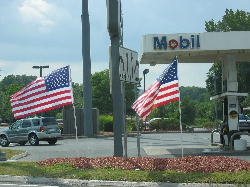The BP whodunit, which has more suspects than an Agatha Christie novel, only some of them British, has pundits from the Beltway to the barbershop busy at armchair detective work. Some have already reached the conclusion, as does the plot of Christie's Murder on the Orient Express, that there is no singular villain: everyone done it. Among the culpable: we citizen-consumers of America, whose thirst for oil and its byproducts has been unquenchable.
With crude gushing into the Mexican Gulf, more are asking the questions raised as the U.S. military was being rushed into the Persian Gulf: will this be the event that leads us to reduce our dependence on oil? Can we reduce it? Since almost half of our consumption goes to power our vehicle fleet, the American driver is being called on for an answer.
And it's pretty pitiful.
Recently, drivers in upstate New York were interviewed about whether or not the BP crisis would cause them to drive less. The answer, deflating and unanimous, was no. Their reason echoed that which we've been hearing from drivers across the country and that is often repeated in the press, a variation of that given by Dwight, who we met at an auto show: "You have no choice! You have to get to work."
For a nation that defines freedom as the maximization of choice and sees cars as an expression of freedom, this should be an astonishing answer. But while Americans claim to love their cars for the freedom they bring, the reality is that we tend to feel trapped by our built environment. Our sprawling country was landscaped by the automotive industry and the oil companies, with a permit by the government. For many of the 94 million commuters who live outside central cities, the car can be the only good way to get to work.
Yet even if options like van and carpools, telecommuting, biking, and light rail were not blossoming, the contention that we have no choice would be a fallacy.
Because commuting is only one of the many reasons that we drive. Amazingly, only 16% of all car trips are made to or from work. Over the past two decades, the numbers of other types of trips have exploded. Most of us take more than four trips per day to get to work, to shop, to run other personal and business errands, to socialize and recreate, and to get our kids to school. The upshot of all of these trips is that the busiest hour on our nation's roads is no longer during the traditional weekday morning or evening commute, but one in the afternoon on Saturday.
We have gotten to the point, as a nation, where we cover 4.6 trillion miles a year in our cars. This has happened incrementally as a result not just of the long-term decisions we have been making buying homes farther from work but of the daily decisions we make to drive to many places besides work. Travel analyst Nancy McGuckin found, for example, that in one six-year period, Americans made over one and half million more stops in their cars to get a bite or a cup of coffee, a trend she dubbed "The Starbucks Effect". Not even the most fiendishly latte-addicted could argue that these are necessary drives.
In other words, we have innumerable points in the week at which as individuals we could choose to drive just a little less, collectively building to a large national total.
Obviously, our choices vary depending on where we live and how much we earn. Some regions have greater density or have better transit options than others. Some families have more discretionary income to make more, and thus reduce more, discretionary trips. But as a nation, we cannot use our history of sprawl and transit underfunding to justify continued car overdependence. And those who can afford to drive less, should.
Cutting down on driving can be more liberation than sacrifice. Shopping online or walking to a local shop eliminates the aggravation of traffic around the big box stores. Biking to run short errands or commutes enables dropping the pricey gym membership. Telecommuting frees up time to walk the kids to school. Driving less doesn't have to feel like work.
But even if it does, we must understand, as we gawk at images from the Gulf, that we share some culpability for that crime. Even if BP's responsibility dwarfs our own individual responsibility, we have no choice but to get to work -- reducing the money and the power we hand over to the oil companies at the pump.
Catherine Lutz, an anthropologist at the Watson Institute at Brown University, and Anne Lutz Fernandez, a former marketer and banker, are the authors of Carjacked: The Culture of the Automobile and its Effect on our Lives (Palgrave Macmillan).
